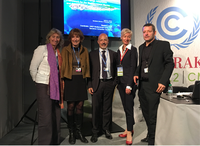The Mediterranean at Climate Change COP 22: Time for Action! – Nov 11, 2016
In the framework of the Climate Change COP 22, held in Marrakesh, Morocco, the United Nations Environment Programme / Mediterranean Action Plan – Secretariat to the Barcelona Convention had a series of side events.
The first one was organized on 11 November 2016, with its Plan Bleu and Priority Actions Programme Regional Activity Centers around the “Mediterranean Climate Change Adaptation Framework”.
It aimed at presenting the instruments developed by the MAP-Barcelona Convention, the analyses and results obtained through the work in the Mediterranean region in terms of climate change adaptation and mitigation.
Gaetano Leone, UNEP/MAP Coordinator presented the Regional Climate Change Adaptation Framework, adopted by the 19th Ordinary Meeting of the Contracting Parties to the Barcelona Convention. He highlighted concrete solutions to support Parties in their practical implementation of the Regional Climate Change Adaptation Framework and of the Integrated Coastal Zone Management Protocol, which entered into force in 2011 and has been ratified to date by 9 Mediterranean countries and the EU. He said: “We are currently mobilizing the resources to support countries in taking this action and we are joining hands with a number of partners in responding within the framework of the Paris Agreement and of the Mediterranean Climate Change Framework, to the challenges of climate change”.
Ms. Daria Povh Skugor, Senior Programme Officer at the Priority Actions Programme/Regional Activity Centre (PAP/RAC), presented the specific case of the Coastal Plan for the Šibenik-Knin County, Croatia, which is a concrete demonstration of the relevance of the Protocol on Integrated Coastal Zone Management (ICZM), for Climate Change in the Mediterranean region.
Ms Anne France Didier, Director of Plan Bleu, presented the “Mediterranean Strategy for Sustainable Development 2016-2025” (MSSD) and the work of the MAP Components highlighting that the Mediterranean Sea and its coastal areas are part of the "nature-based solution" to adapt to Climate Change.
Climate change could exacerbate existing stresses and inequalities within and among countries. Providing an example of action and implementation at the national level, Ms. Catherine Chabaud, Delegate to the sea and the coast at the French Ministry of Environment, presented the Mediterranean Plan for Blue Growth. This national initiative of regional cooperation is part of the coalition on Oceans and Climate of UNFCCC COP21, and builds on existing programmes and projects developed at national and regional level, and takes particularly into account UNEP/MAP-Barcelona Convention activities and actions.
Recent research results on the impacts of climate change on the Mediterranean Sea were also presented by the Mediterranean Institute for Oceanography in the same side event.
Gaetano Leone, UNEP/MAP Coordinator, was also invited to the closing session of the "Ocean Day" at COP22, which focused on action in the Mediterranean. After the introductory statements by Minister Segolene Royal of France and Prince Albert of Monaco, he presented the framework of the MAP-Barcelona Convention, its instruments and work, and recent results of the mobilization of resources for action, namely the approval of the GEF-funded MedProgramme, the Cooperation Agreement between Italy and UNEP/MAP, and the relevant projects that were recently approved and whose implementation has started. Gaetano Leone said: "The MAP-Barcelona Convention system continues to be the unique framework, with its legally-binding instruments and its capacity to mobilize political will and cooperation around the basin, for action. The initiative of France with Monaco and Morocco for a set of activities supporting Blue Growth is well inscribed in this framework". The event was closed by Minister Hakima El Haité of Morocco who referred to the urgency of responses in the Mediterranean to the challenges of climate change. "
Climate change and variability is becoming increasingly evident. According to observations and studies referenced in recent IPCC reports, the Mediterranean region will be heavily impacted by climate change during the 21st century.


